The screams were so loud they startled neighbors out of bed.
It was just before midnight on Oct. 2, 2016, and at least three people in the multimillion-dollar houses clustered between Pacific Coast Highway and the beach called police. Others wandered toward the home of an attractive, wealthy, young doctor, where they could hear a woman yelling: “Get off of me!”
Inside, a woman would tell Newport Beach, California, police, she woke up wearing only a shirt and underwear with a man on top of her, hitting her face, with her roommate lying next to her. When she was able to get the man off of her, she said, she lay on the floor crying while he used a phone to record her. By the time police arrived, she and her roommate had managed to lock themselves in a bathroom.
She told one officer she had no idea how she got to the home of Grant Robicheaux, then a 36-year-old orthopedic surgeon who a local magazine once named “Bachelor of the Year” and whose dating exploits landed him an appearance on a Bravo reality show. She said she only remembered going out for drinks with her roommate, meeting a woman and her boyfriend at a bar, then blacking out.
The officer noted in the police report the woman had bloodshot eyes, alcohol on her breath, and a hard time keeping her balance. She was so intoxicated, the officer wrote, that five minutes after interviewing the woman, the officer came back to her and “she did not remember talking to me the first time.” Meanwhile, Robicheaux denied assaulting her and said he’d simply tried to calm her down when he woke up to her screaming in his home.
Police left that night without making any arrests, but two years later, authorities announced they’d discovered a pattern: Robicheaux and his girlfriend, Cerissa Riley, were accused of drawing in unsuspecting women at restaurants and bars and on dating apps, spiking their drinks, taking them home, and raping them. Making those charges — which the couple denied — was Orange County District Attorney Tony Rackauckas, a politically connected, five-term prosecutor who, in a shocking appeal for other victims to come forward, said investigators were reviewing up to 1,000 videos that could show women being assaulted.
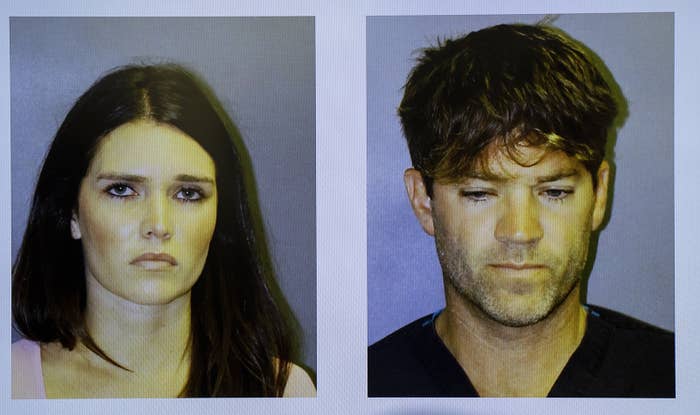
The charges made national headlines, setting the stage for a high-profile trial that prosecutors promised would expose the alleged drug use and sexual abuse by a glamorous and telegenic Southern California couple. For Rackauckas, the case put him on screens across the country just as he faced one of his toughest, most contentious reelection campaigns. And eight women, who had never met each other but described disturbingly similar encounters over the course of nine years, hoped for some kind of justice.
But nearly three years later, the criminal case has been kicked around the court system after years of local political squabbling. The California attorney general is now seeking to dismiss most of the charges, arguing that “evidence is insufficient” to prove most of the alleged crimes beyond a reasonable doubt. On June 11, a judge will hold a hearing before deciding if the case — with the accounts of the women, hundreds of images, text messages, drugs, and illegal guns — will be reduced to just the charges surrounding one woman’s experience. Now, after years of agonizing limbo, the others may lose their chance to ever have their case heard by a jury, their stories lost in the dust of the political fight between Rackauckas and his longtime rival and the current Orange County DA, Todd Spitzer.
A judge at one point called out both men for using the case as a weapon during their campaign against each other.
“The political aspirations of District Attorneys, past and present, and their thirst for media attention have created a minefield of legal hazards in this case,” Orange County Superior Court Judge Gregory Jones wrote on June 5, 2020.
“It’s a ridiculous situation that these two men are more concerned about politics than the actual case,” one of the alleged victims, who asked that she be identified by the pseudonym Julie, told BuzzFeed News in an interview last year. “It’s a case of women being absolutely trampled. Here are two men who are in a position to help women, but instead are more concerned about their egos.”
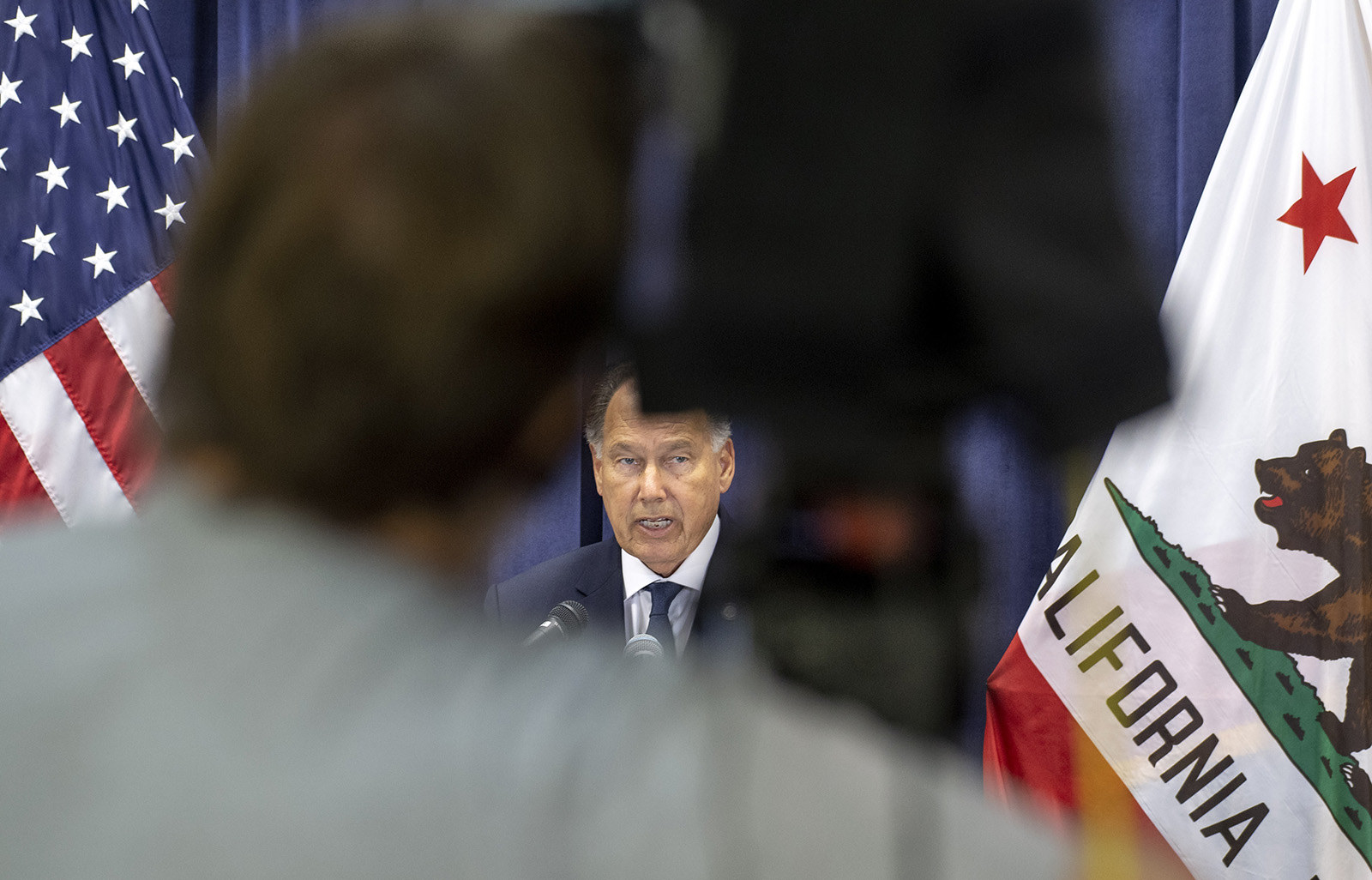
For years, Rackauckas served as Orange County’s top prosecutor, an insider in what was a Republican stronghold. A former Superior Court judge, he was first elected to his seat in 1999 and held on to it firmly for 20 years.
In September 2018, as he was seeking election for a sixth term, he knew the Robicheaux case would bring him valuable publicity. The announcement garnered the headlines he’d expected — but also a new line of attack from his political opponent, Spitzer, and the criminal case quickly turned into the center ring of the men’s struggle for power.
The bad blood between the two men goes back at least 15 years, when Spitzer first looked to unseat Rackauckas in 2006. The two seemed headed into a tough campaign fight but, instead of a brawl, Rackauckas ended up bringing Spitzer into his circle. Spitzer dropped his campaign and took a position as an assistant district attorney under Rackauckas in 2008 as he was groomed for an eventual takeover.
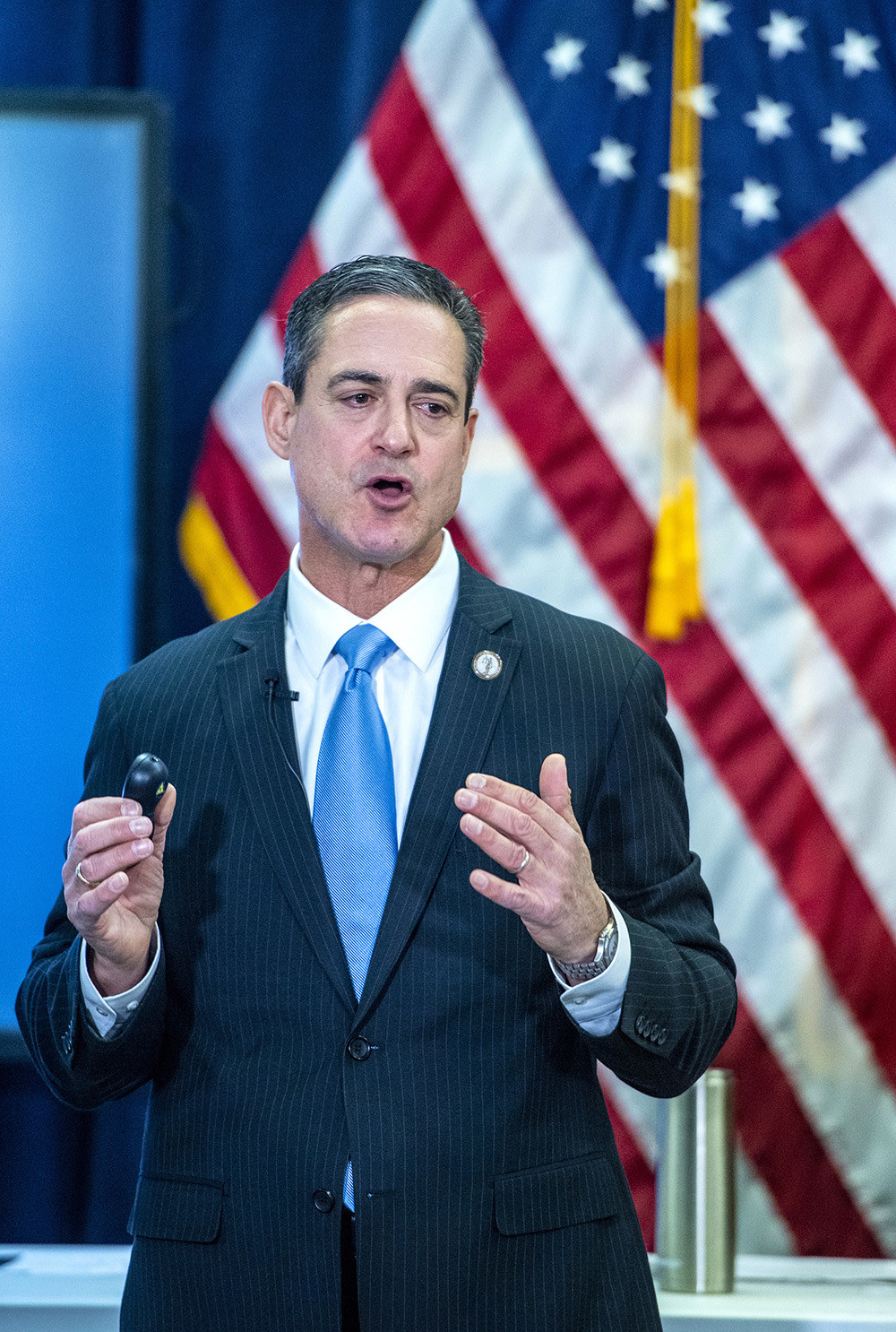
Spitzer was seen as a rising star in the county’s tight-knit Republican camp. He’d served on the board of supervisors from 1997 to 2002, then moved on to the state legislature, winning three terms in the state assembly from 2002 to 2006. He branded himself as an advocate for crime victims, serving as chair and campaign manager for 2008’s Marsy’s Law, which guaranteed rights including a chance to speak at defendants’ sentencing hearings and became a model for similar laws around the country. As Rackauckas neared age 70, it seemed like a done deal that he’d hand over the reins of the district attorney’s office to the younger man.
But in August 2010, Rackauckas turned on his new protégé. He suddenly fired Spitzer and announced that instead of retiring, he would seek reelection. Spitzer was escorted out of the DA’s office, but remained active in local politics. He won back a seat as a county supervisor in 2012. For years, the two men seemed to never miss an opportunity to take a jab at one another in their frequent interviews with reporters and public appearances.
Then in 2018, Spitzer finally seized his chance to unseat his former boss. The result was a bitter campaign that state judges, staff within the DA’s office, and the women who accused Robicheaux of rape have said spilled into the case, tossing it into turmoil.
In their most public clash, just a month before the election, Spitzer accused Rackauckas of delaying the arrest of Robicheaux and Riley for nine months to maximize media attention. To back up his claim, Spitzer distributed copies to reporters of a sealed search warrant that was served Jan. 9, 2018. Though authorities referred at that time to Robicheaux and Riley as “high risk predators,” no arrest was made until September 2018 — just two months before election day.
“What desperate human being, let alone a prosecutor, sits on a case for the purpose of using it close to a re-election to get free publicity and so he could be viewed as a hero to save the day helping new victims?” Spitzer said in a campaign statement at the time.
Speaking to BuzzFeed News, Rackauckas acknowledged that he fully expected the case to give him publicity during his reelection bid, but that wasn’t why the arrests took place when they did. He wasn’t even briefed on the case by his top deputies until two weeks before the arrests, he said.
“The motivation for that was all to properly handle the case the way we should, period,” he said. “Do I believe it was a high-publicity case? Yes, I do believe that there being publicity because of a high-publicity case close to the election could be good for me as a candidate. … Did I want to get reelected? I did want to get reelected, but that wasn’t my motivation.”
Spitzer, through a spokesperson, declined to answer questions about whether politics played a role in how he and his office handled the criminal case. He continued to blame his rival for the fumbling of the case, especially the claims made by Rackauckas about video evidence.
“The prior District Attorney represented that there were up to 1,000 unconscious sexual assault victims on video,” Kimberly Edds, spokesperson for the Orange County District Attorney’s Office, said in a statement. “In fact, there were none.”
In the nearly three years since the charges were first announced, the case has focused little on the accounts of the eight women. Instead, two of them told BuzzFeed News the bizarre and often combative proceedings have left them feeling like they’ve not only had to fight their alleged rapist, but the prosecutor’s office that was meant to bring them justice.
“I’m not only taking on Robicheaux,” one of the women, who asked to be identified in this article as Mary, told BuzzFeed News. “I’m now taking on a bully and a politician.”
“Frankly, I don’t think they care,” Julie added.
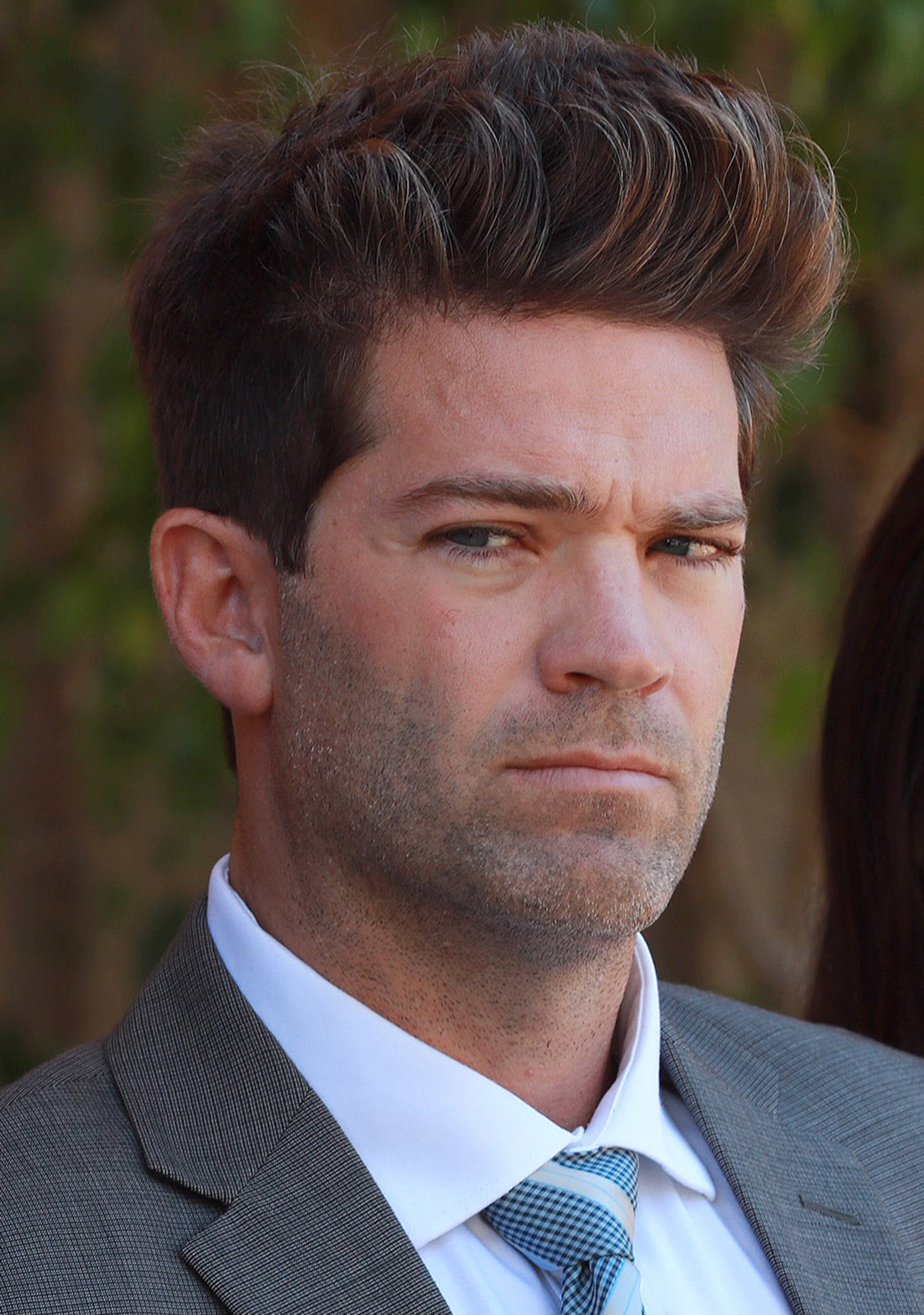
The woman who found herself in Robicheaux’s home in October 2016 is identified in court papers as Jane Doe #4. After Robicheaux and Riley’s arrest, prosecutors said more than 100 women reached out to investigators regarding their interactions with the couple. Ultimately, Robicheaux was charged with 17 felonies and Riley with 14, to which they pleaded not guilty.
In court filings and in interviews with BuzzFeed News, attorneys for Robicheaux and Riley have said the couple is innocent of all the charges filed against them. These are the stories of eight women who said they were drugged or raped, or both, as told in police and court records:
Jane Doe #1
Jane Doe #1 met Robicheaux at a bar in Hermosa Beach, and they went on to see each other a couple of times and exchange text messages.
Then on Sept. 7, 2009, she walked back with him to his house after meeting up at a bar. The two started kissing on top of his bed, but she said she told him she was uncomfortable with the situation. He told her she was being “unclear” and kept kissing and undressing her.
She panicked because Robicheaux had talked about having guns in his closet, and she said she teared up as Robicheaux started having sex with her, telling her, “We are having sex now, so there’s no point in saying no.”
She didn’t scream or push him off, she said, but instead told him she enjoyed it, hoping it would be over quickly. When he finished, she said he told her, “Glad we were adults and we can consent to this.”
Jane Doe #2
Jane Doe #2 first connected with Robicheaux and Riley on March 14, 2015, through Tinder.
The 20-year-old met the couple at a hotel in San Diego, then went out with them to a club where she had one drink. After coming back from the restroom, she said, Robicheaux gave her another drink and she lost all memory of what happened after.
Her next memory, she said, was waking up in a hotel bed with two bodies that seemed to be having sex with her. She was conscious only seconds, she said, but remembered hearing Robicheaux trying to reassure Riley that she wasn’t waking up.
She woke up again in the morning, she said, to Robicheaux having sex with her and feeling like she couldn’t move her body.
Jane Doe #3
About a year later, Jane Doe #3 met the couple in the Newport Beach docks on April 10, 2016, and headed to a bar with a group. At the bar, she had four drinks, including some that were handed to her by Riley. She felt, however, as if she had drunk 10 beers, she said, and was so intoxicated she needed help walking into Robicheaux’s home.
There, she said Robicheaux gave her a white powdery substance and an orange pill, which made her feel “awful,” “relaxed,” and “intense.” She couldn't stand up, she said, and Robicheaux and Riley began to take off her clothes.
Robicheaux began to have sex with her while Riley recorded it on an iPhone, she said. Throughout the whole thing, she said she felt like she couldn’t move and was unable to resist.
Jane Doe #5
Jane Doe #5 met up with Robicheaux during a Halloween party at his home on Oct. 29, 2016. She was drinking a vodka cranberry that she noticed tasted a bit salty, prompting her to ask the couple if it had GHB in it, or gamma-hydroxybutyrate, which is used as a date rape drug. According to the original charges, Riley and Robicheaux admitted it did.
She blacked out on a couch, and the next memory she said she had was lying naked on Robicheaux’s bed, being raped by the man while Riley touched her body. At one point, she said, Robicheaux began to get “rough” until Riley told him to stop.
She said she felt she had no ability to resist and, when she was able to get to her feet, locked herself in the bathroom, although she said she felt she was not capable of screaming or yelling for help, describing it as a “nightmare.”
Jane Doe #6
The woman known as Jane Doe #6 met Robicheaux on the dating app Bumble but, when she was supposed to meet the man at a restaurant on April 16, 2017, he showed up with Riley.
The three ended up at another bar and, in the bathroom, she said Riley offered her cocaine. Soon afterward, she said she lost memory of what happened next, including how or when she left the bar.
Her next memory is walking up a staircase, feeling unable to stand and going in and out of consciousness. At one point, she remembered sitting on a bed partially naked with Riley and Robicheaux, who she said were trying to undress her.
She said she felt scared and Robicheaux held her firmly to keep her from standing up. Robicheaux was doing drugs off of Riley’s body, while Riley told her she “didn’t have to do anything she didn’t want to.”
Robicheaux then allegedly gave her water with PCP, but she became scared and locked herself in another bedroom. Riley tried to coax her out, the woman said, telling her Robicheaux was going to “get really mad and hurt them both.”
At one point she said she heard Robicheaux screaming at Riley, telling her, “[you] always make the girls fall in love with you and they never have, they don’t wanna be with me because they just want you.”
Ultimately, she snuck out of the house — after finding the couple’s driver’s licenses and taking photos of them.
An accusation without charges
Three months later on July 3, 2017, another woman contacted Newport Beach police immediately after an encounter with Robicheaux, claiming she had been raped and drugged as well. Prosecutors did not go on to file charges from her allegations, but investigators included the police report in a warrant to search Robicheaux’s house.
According to police, the woman’s memory “was not clear and at times her statements inconsistent,” but she had gone home with Robicheaux after a concert. There were about 15 people at the house, where she said she was offered a white substance she believed was cocaine.
She said she had consented to having sex with Robicheaux at first, but they stopped because he could not perform. Later that night, Riley offered her a drink and the woman said she blacked out, waking up later that night in Robicheaux’s room wearing a T-shirt, with the man naked next to her.
“The victim believed she was drugged because she did not know what had occurred,” the police report read. She then got dressed, grabbed her purse, and called police just before 6 a.m. the next morning.
Jane Doe #7
Just days later, Jane Doe #7 was invited by Robicheaux to a boat party on July 8, 2017, where she became intoxicated, lost her shoes in the water, and went back to Robicheaux’s home to lie down on his bed.
Moments later, she said, Robicheaux came to the room and began to masturbate in front of her. He then pulled her toward him and tried to have sex with her. She pulled away from him, but he continued to move her, raping her, she said.
She said she kept pulling away from him, but she was so intoxicated she was close to blacking out. When she was able to, she left the room, walked downstairs, and left the house.
Most of the women did not initially go to police, but came forward after Robicheaux and Riley were arrested and their pictures were plastered over local news.
Julie, who is one of the Jane Does, had told close friends about her alleged attack, but like many rape victims, she didn’t immediately go to law enforcement. She knew rape could be a difficult case to prosecute, and hearing that other women had come forward gave her new confidence.
“There are now multiple voices against his,” she said. “There is a sort of strength in numbers.”
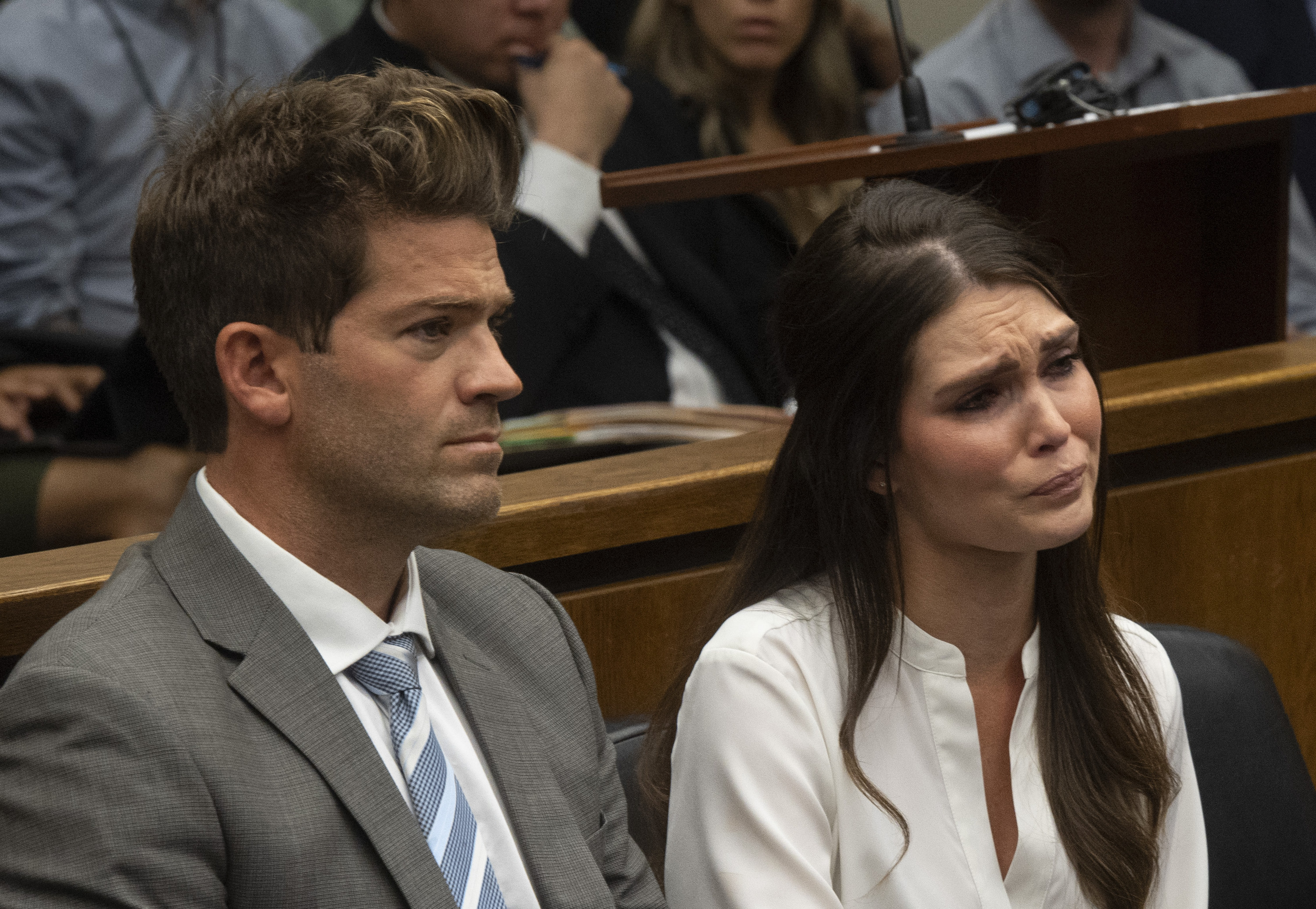
It had been Jennifer Kearns, an investigator in the district attorney’s office with nearly 30 years in law enforcement, who first put together the pieces that would launch the case against Robicheaux.
Newport Beach police had closed two separate cases of women making allegations against Robicheaux without seeking charges, stating the women did not respond to inquiries from investigators, or that no crime had occurred.
After noticing the multiple complaints against him, Kearns tracked down and interviewed the women again. She took what she’d learned back to Newport Beach police, and they got a search warrant.
Inside the Robicheaux’s beachside home, investigators found cocaine, hallucinogenic mushrooms, illegal guns, ecstasy, and GHB. Police also seized phones and computers to be reviewed for possible evidence.
In his initial press conference in September 2018, Rackauckas said investigators had found hundreds of videos, many that contained women who looked intoxicated “beyond the ability to consent or resist, and they’re barely responsive to the defendants’ sexual advances.” When asked by a reporter how many “videos do you have of different victims,” Rackauckas agreed there may be more than “a thousand.”
Tony Rackauckas, then the Orange County district attorney, speaks at a press conference on Sept. 18, 2018, about the possibility of there being up to “1,000 victims.”
His suggestion that Robicheaux and Riley may have assaulted up to 1,000 women and recorded it all turned a local case into an international story. Just weeks before the election, Rackauckas was appearing in national news outlets, many of them repeating the possibility of up to 1,000 victims.
The only problem is it wasn’t true.
Rackauckas told BuzzFeed News he was misunderstood when answering the question and did not mean to suggest there had been up to 1,000 victims, but instead, that investigators were reviewing up to 1,000 videos for possible victims.
If there were factual errors in news stories, however, Rackauckas and his office seem to have made little visible effort to correct the record. His chief of staff, in fact, tried to expand the media attention on the case, emailing outlets with a national audience.
“We would like an opportunity to come on the show,” the chief of staff, Susan Kang Schroeder, emailed a producer of The Howard Stern Show just weeks before the election. “We now have more than a dozen new potential victims thanks to shows like you getting the word out.”
Rackauckas made no large-scale effort to correct the record until Nov. 6, 2018 — the day of the election. His office then issued a press release clearing up the statement, just as voters headed to the polls to decide Rackauckas’s fate.
On Nov. 6, 2018, Spitzer won 53% of the vote, unseating his former mentor and marking a new era in the DA’s office.
“When he actually won, I was concerned,” Julie said. “This was a person that indicated they were totally fine using this case for political advantage.”
The men’s campaign against each other had even included an episode in which a judge considered holding Spitzer in contempt of court. After Spitzer handed out copies of the sealed search warrant that referred to Robicheaux and Riley as “high risk predators,” Rackauckas called a lawyer for one of the alleged victims. That attorney then went to the judge, accusing Spitzer of recklessly releasing sensitive information. The judge eventually sided with Spitzer, finding that he had obtained the warrant before it had been sealed.
Though Spitzer won that skirmish, at his swearing-in ceremony eight weeks later, he showed that the Robicheaux case — and his fight with his forerunner — remained top of mind.
Orange County District Attorney Todd Spitzer at his swearing-in ceremony
“The prosecutors in [the Robicheaux] case ran upstairs after that press conference that I held and asked Judge Jones to hold me in contempt,” he told a theater full of those and other prosecutors minutes after being inaugurated as the new DA. “Now I’m their boss.”
Matt Murphy, who represents five of the alleged victims in the Robicheaux case, was a homicide prosecutor in the DA’s office at the time. In court filings, he wrote that Spitzer’s comments sent an ominous message to staff: “There was a pronounced chill.”
Edds, the spokesperson for the Orange County District Attorney’s Office, told BuzzFeed News that Spitzer’s comment was not meant to be menacing — he was instead trying to “address the elephant in the room.”
Yet by September 2019, Spitzer was making clear he didn’t think much of the office’s work on the Robicheaux case as he continued to disparage his predecessor.
In a letter to then–California attorney general Xavier Becerra, Spitzer asked that the state take over prosecution, alleging “prosecutorial misconduct from the very beginning” and that Rackauckas moved forward in the case to generate publicity and try to win the election.
“That’s bullshit, where I start getting called names again, and talk about how what terrible stuff I’ve done and everything,” Rackauckas told BuzzFeed News. “Jesus, didn’t we get over that yet? Didn’t he win the campaign? Why can’t he just go about his business and move on?”
At that time, the attorney general declined to take on the case and sent it back to Spitzer. Instead of moving forward toward trial, though, Spitzer appointed a committee to review the evidence. While that was underway, he placed its lead investigator on administrative leave and replaced the lead prosecutor, saying at the time he wanted new eyes on the case.
On Feb. 5, 2020, after the completion of the evidence review, Spitzer dropped his bombshell: The new DA announced he wanted to dismiss all charges, he questioned the credibility of some of the victims, and he apologized to Robicheaux and Riley.
“What happened to their lives and how this case materialized is nothing short of a travesty,” he said in a lengthy press conference.
“This is not pleasant at all,” he added. “I didn’t create this situation, but it’s my responsibility to fix it.”
Michael Fell, an attorney for Jane Doe #4, stood in the room as Spitzer laid out his decision in front of cameras and reporters.
“How is my client getting justice?” he asked Spitzer.
“There are issues about your client and her background that call into question her veracity,” Spitzer replied. The DA at first declined to go into detail, then acknowledged he was talking about a prior — and unrelated — DUI.
Julie told BuzzFeed News Spitzer’s move to drop all charges “took the air out” of her. She and Mary said they were notified just minutes before the press conference.
“I feel that Spitzer has tried to silence us,” Mary said. “How do you dismiss a case without listening to the victims or giving them the time of day? It’s not possible.”
Edds, the spokesperson for the district attorney’s office, said Spitzer has been open to speaking with the women or their attorneys. He’s spoken to two of the eight women named in the indictment, she said, over the phone.
Julie didn’t get to talk to Spitzer personally until after the press conference, and when she got on a call with him, she said, she was placed on speaker phone with at least five members of his staff. She was then told there were also concerns about her account of the alleged rape, she said.
“I was enraged,” she said. “I didn’t feel comfortable defending myself over the phone in that environment.”
Though Spitzer tried to drop the charges, a judge didn’t immediately let him.
In his June 5, 2020, ruling, Judge Jones pointed out that when Spitzer requested that the state attorney general pick up the case the previous year, he never said it was “unprovable.”
Instead, Jones said Spitzer made the “unusual and curious” decisions to launch the review and dismiss the lead prosecutor and investigator.
The judge also described Spitzer’s allegation that the case had been “manufactured” by Rackauckas — something that would have needed the cooperation of police, victims, and neighbors who called 911 — as baseless.
“This allegation by Mr. Spitzer is simply ludicrous, and frankly, raises significant concerns about his motivation for filing this motion to dismiss,” Jones wrote in his ruling. “The political actions of Mr. Spitzer have also been problematic.”
It was a rare move by a judge, denying a prosecutor’s motion to dismiss their case despite their assertions that there isn’t enough evidence to proceed.
“[The trial] was definitely a political football,” Laurie Levenson, a professor at Loyola Law School, told BuzzFeed News. “I think there is concern that there is a conflict of interest that these charges were brought, and perhaps dismissed, because of political consideration.”
After denying Spitzer’s motion to dismiss, the judge sent the case to the state attorney general’s office. Almost a year later, attorneys for AG Rob Bonta said they’d made their own review of the evidence and are seeking to drop most of the case except the charges related to Jane Doe #6.
It will be up to Judge Steven Bromberg whether the charges are in fact dismissed and what happens next. A hearing is scheduled for Friday.
In a hearing in May, Deputy Attorney General Yvette Martinez said the state didn’t believe it had the evidence to back up the other charges, though she added prosecutors weren’t trying to discredit the accusations of the other women.
She also acknowledged the fight that had preceded her office taking over the case.
“This case is a political firestorm,” Martinez said, according to the LA Times.
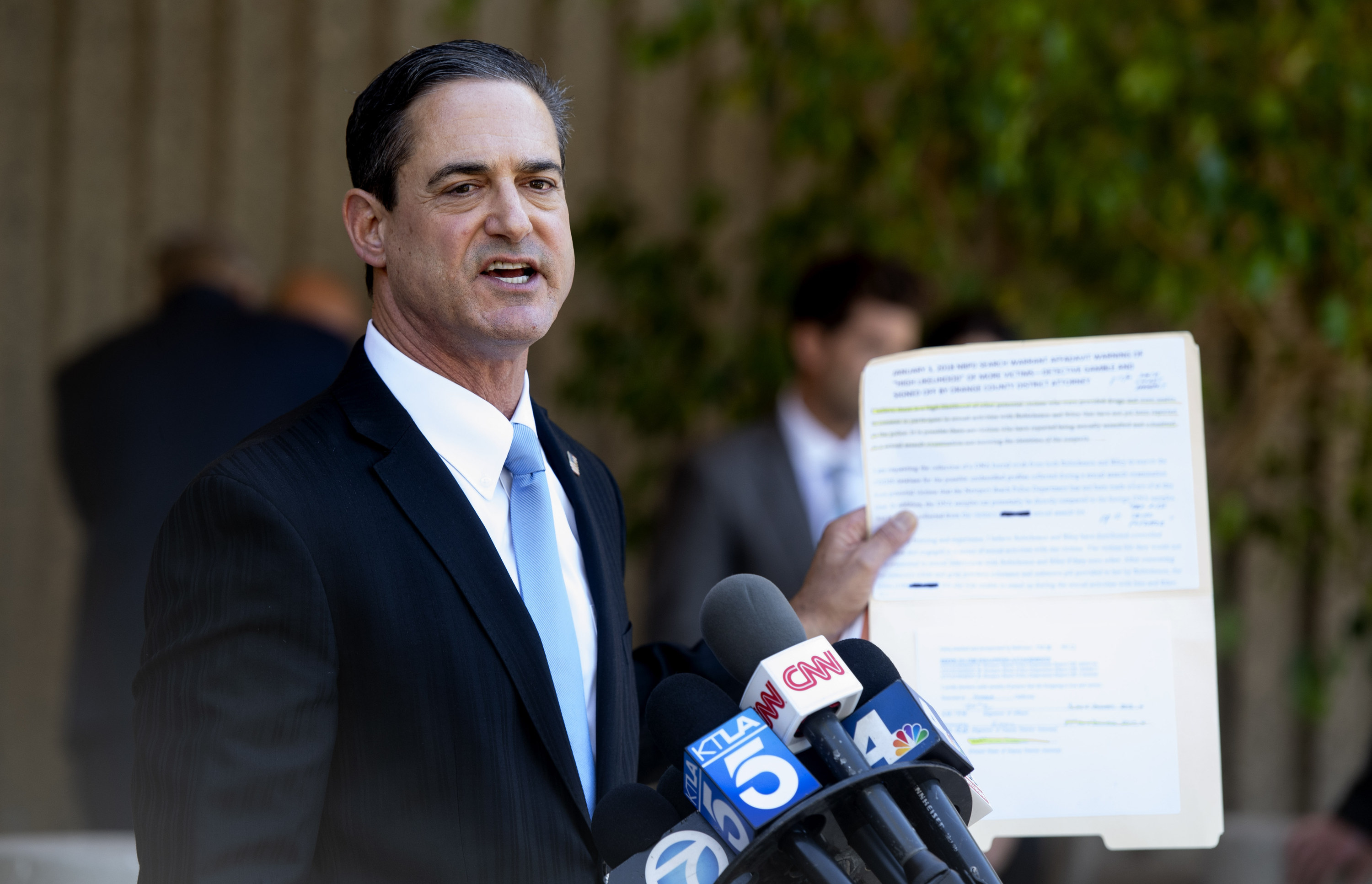
Exactly why the attorney general wants to drop most of the charges is so far known only to the attorneys and the judge; a motion was filed under seal last week.
It’s true the video evidence that Rackauckas seemed to promise when he first announced the charges never materialized. Spitzer described it as the “centerpiece of the controversy” as he attempted to have the charges dropped, and the ultimately faulty insinuation became key to his claim that the former DA “manufactured” the case. A review of the hundreds of images and videos did not turn up one showing the victim of a sexual crime, Spitzer said.
But Spitzer’s review of the case had a “predetermined outcome” and only served to find a reason to dismiss the case, according to Kearns, the lead investigator who first linked the multiple allegations against Robicheaux.
Philip Cohen, Robicheaux’s attorney, disagreed, arguing Spitzer had nothing to gain from dismissing the case.
“There is zero basis, zero evidence, zero facts to indicate that Spitzer has done anything untoward in respect to how this case was reviewed — zero,” he told BuzzFeed News. “This concept that Spitzer has to be motivated by some sort of political reason, I just don’t understand. And just in the big picture standpoint, what’s in it for Spitzer?”
In April, Kearns filed a lawsuit claiming her boss, Spitzer, “colluded with the defense while engaging in a concerted political campaign to undermine the prosecution, discredit the victims, and ultimately destroy the criminal case against the defendants.”
She also claimed Spitzer retaliated against her to torpedo the case. Spitzer, she said, added to her workload to distract her, cut resources in the investigation, and at the end, removed her from the case and placed her on administrative leave. Kearns has since been reinstated to her old position, the spokesperson for the district attorney’s office said.
According to a department memo reviewed by BuzzFeed News, Kearns was found to have violated four department policies in connection to her work in the Robicheaux case, such as not including “incriminating and exculpatory evidence, as well as information that may adversely affect the credibility of a witness” in her interviews with two of the alleged victims.
The supervisors who assessed an internal investigation into her work also noted the separate review of the Robicheaux case ordered by Spitzer contained “inaccurate and misleading information.” Ultimately, the DA’s senior investigators questioned the “overall merit” of Spitzer’s review.
Spitzer’s office, in a statement, denied the allegations made by Kearns.
“The members of the De Novo review team made it unequivocally clear in their June 11, 2020 motion that their ‘review was conducted without interference and without any pre-ordained conclusion’ and ‘our motion was based on our sincere — and continuing belief that the totality of the evidence in this case is insufficient to prove the charges beyond a reasonable doubt,’” Edds said in a statement.
Rackauckas disagreed. The problem wasn’t the evidence, he told BuzzFeed News, but rather Spitzer.
“The conflict is Todd Spitzer is on the defense’s side of the case, not the prosecution,” Rackauckaus said. “I think he wanted to get rid of the case.”
Despite the media frenzy around the videos and Spitzer’s focus on them, Rackauckas now says they were never the driving force behind the case. He pointed out charges related to the women’s accusations were filed before the electronic evidence was reviewed, not after.
The former DA also argues there was plenty of other evidence to push the case through court, and of course, most sexual assault cases don’t involve video showing the attack. Instead, prosecutors could show the pattern presented by the women, who didn’t know each other, but described similar details about how they were allegedly approached by Robicheaux and Riley. Multiple women described blacking out or feeling incapable of moving, as well as being recorded. There were also drugs found in Robicheaux’s home, Rackauckas told BuzzFeed News, consistent with the women’s accounts.
“It’s just a travesty to just throw all that out,” he told BuzzFeed News. “The real core of the case, the real evidence of the case is several different victims giving their statements independently and all being pretty similar in terms of what they say happened to them and so they corroborate each other in that regard.”
But the damage has been done, according to Cohen, Robicheaux’s attorney. Rackauckas’s insinuation that up to 1,000 women could have been victims, he said, stacked a high-profile, headline-grabbing case against his client.
“People who usually speak first and speak the loudest is what people typically embrace as true, and they remember that statement, and the continued dissemination of that statement from Rackauckas’s office has caused tremendous and irreparable damage to this case,” Cohen said.
Amid all the loud voices, spanning years of proceedings, the group of eight women are no longer sure they’ll ever be heard. Mary described her frustration; she’d tried to do her part.
“I did what my parents and teachers told me to do when I was small, and it was call the police, and do the right thing, and follow the process,” she said.
That process has been far from what she expected when she first went to the police.
“I didn’t know what this was — that it was going to be a political circus, that I would fall on the backside of it and be forgotten about,” Mary said. “I just wanted justice.” ●
